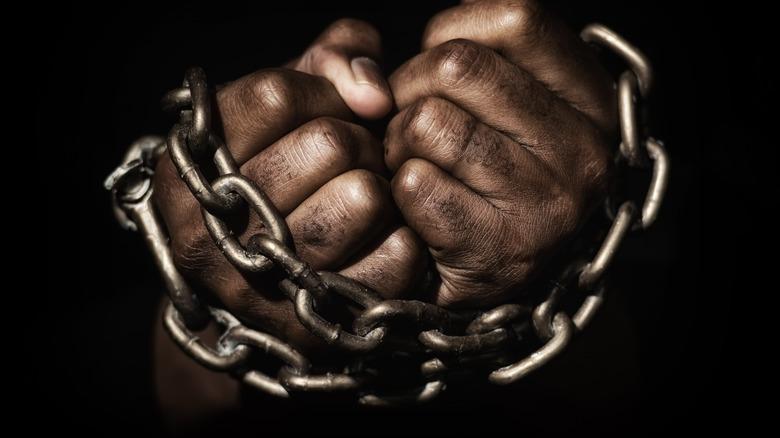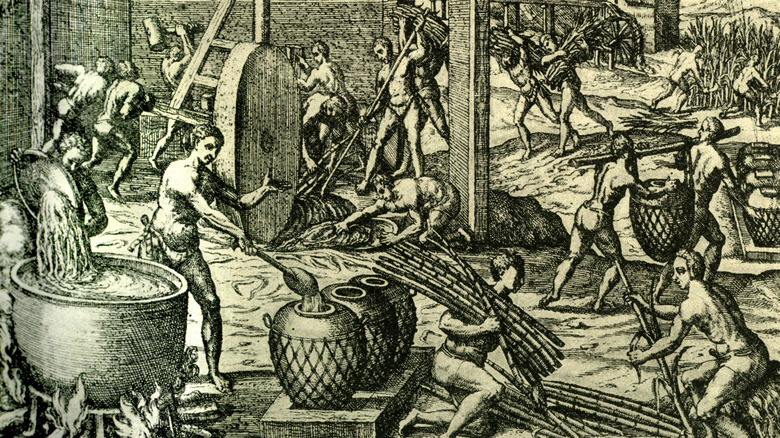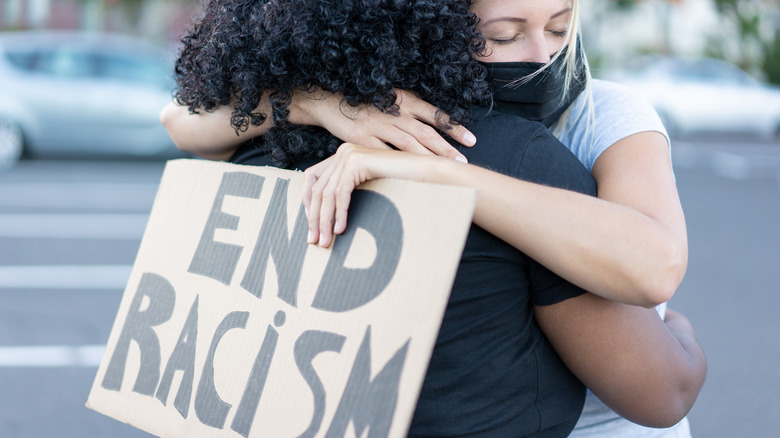How Would The U.S. Look If Slavery Never Happened?
The United States of America was largely built on the backs of slaves. That the economic fabric of this country was, for centuries, tied to slave labor hardly needs explaining. Further, many of the founding fathers owned slaves, and even the White House was at least partially built from slave labor, as ABC News notes.
The existence of chattel slavery was a dark cloud that hung over this country even from before its official founding. While many Americans vehemently opposed slavery, and/or its expansion, on moral grounds, slavery also constituted an economic problem. As Teaching History reports, the economy of the Northern states was largely built on industry and, as such, didn't rely on slave labor, while the situation was reversed in the agricultural South. Meddling with that equation could have tipped the balance of power — economic and political — in one direction or the other.
But what if slavery had never existed in the U.S.? What if, collectively, the people who founded and settled the United States had decided from the beginning that slavery was immoral and illegal? What would the country have looked like in that situation? Before delving too deeply into the thought experiment over what the United States might have looked like without slavery, it bears noting that African chattel slavery was not limited to the U.S.
Slavery wasn't just an American issue
As noted in the Alternate History Hub video "What If American Slavery Never Existed" (posted on YouTube), the African slave trade affected large portions of the New World. Many of the islands of the Caribbean were populated by slaves, working the sugarcane fields, and benefiting the colonial powers of Spain, Portugal, and the United Kingdom. Had slavery not existed, that colonial-era wealth would have had to come from somewhere else, or might never have existed at all, completely rewriting the history not only of those colonial powers, but of that Caribbean islands as well. "Sugar profits fueled the foreign policy of the 17th-century world," notes the narrator of the Alternate History Hub channel, adding that those profits were invested back into the very ships through which those colonial powers, and others, carried out their wars.
Writing in Liberal First, Earl Watt posits situation in which slavery is not legal in the American colonies, but legal in the Caribbean ("a Portuguese ship approached the coastline of Virginia hoping to sell 20 African slaves, it was sent on its way since slavery was forbidden in the colonies," he wrote). Watt estimates that 365,000 to 600,000 African slaves were brought to the American colonies. Had they been turned away, they likely would have wound up in the Caribbean and worked as slaves there.
The South and North would still have developed separate economies
As such, the Black population in the U.S. would have been considerably lower then, and would be lower now, because slaves would not have had descendants here. Further, there would have been no slaves escaping to Canada, as the journey there from the West Indies (vs. from a Southern state such as Alabama) would have been considerably harder.
Legislation is one thing, climate is another, and as such, Watt postulates, via Liberal First, that even absent slavery, the Northern and the Southern states would have developed different economies. The North's economy would still have been largely built on industry rather than agriculture, considering that the weather is less amenable there to farming, while the South's would have still depended on agriculture. However, in this version of the South, without slaves, gone are the large-scale plantations, making their owners fabulously wealthy, and instead the region would have consisted mostly of small-scale farms.
These two separate directions of their economies would still have forced the North and the South to reconcile their futures, even without the matter of slavery. In Watt's prediction, the South still secedes and forms its own nation. Therefore, the 2021 map of North America would consist of three countries: Canada, the United States, and the Confederate States — only without slavery.
The racial problems we have today might be amplified (or maybe not)
There's little doubt that many, if not most, of the racial problems bedeviling Blacks and whites in the U.S. can at least partially be tied to the specter of slavery. For centuries, one group literally owned another group, and we continue to wrestle with the fallout from that ugly stain on our history.
In "What If American Slavery Never Existed?," Alternate History Hub posits that there might have been no belief that enslaving Blacks was simply the natural and God-ordained thing for whites to do. That didn't necessarily mean "tolerance and sunshine." In this alternate reality, Africans are simply not thought about at all, and there is no place where Blacks and whites interact with each other.
However, writing in Liberal First, Watt doesn't see it that way. He suggests a United States with a considerably smaller Black population, albeit with better relations. Specifically, he points to Canada and Mexico, neither of which ever enslaved Blacks, and both of which have small Black populations. In both places, the racial gap exists, but it's smaller than it is in the U.S. Without slavery, perhaps race relations in the U.S. would have been better?
Prejudice would still be an issue
Racism is not confined to whites hating Blacks. And of course, Blacks aren't the only "foreign" group to have provided cheap (or free) labor to wealthy whites in the U.S. An untold number of Chinese immigrants helped build the West, and anti-Asian hate is still very much a thing in this country.
Further, prejudices and hate don't just come from racism. Religion, culture, and national identity also inform our prejudices. Imagine a United States that looks much like Europe does now — which is to say, mostly white, thought with various immigrant communities. Alternate History Hub (via YouTube) still thinks that Americans would find plenty of reasons to hate each other, even without absent Blacks. The Russians, Germans, English, Irish, Italians, and others who settled this country bring different cultures and religions, and those differences could have been the source of other major conflicts in U.S. history. Even today, those differences are sometimes not far from the surface.




